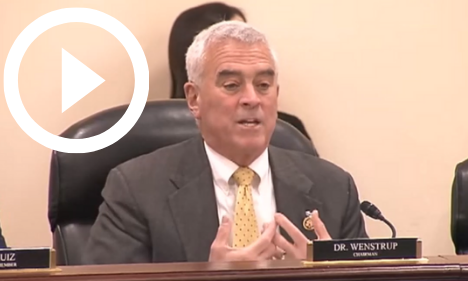Wenstrup Opens Second Hearing on Vaccine Safety Systems
WASHINGTON — Select Subcommittee on the Coronavirus Pandemic Chairman Brad Wenstrup (R-Ohio) opened today’s hearing titled “Assessing America’s Vaccine Safety Systems, Part 2” by describing how the Select Subcommittee seeks to improve future pandemic response through substantive reform of federal health agencies and by restoring trust in public health tools. Chairman Wenstrup detailed how the vaccine injury reporting and compensation systems controlled by these federal agencies were not prepared to handle the massive influx of injury claims caused by the COVID-19 vaccine. Doctors and patients who relied on the vaccine safety systems for both accurate data and compensation were often left without answers or solutions. Today’s non-governmental witnesses will share their personal experiences interacting with these inadequate vaccine safety systems, express concerns with the federal government’s response to vaccine injuries, and highlight legal actions taken to rectify adverse events resulting from federal mandates. Chairman Wenstrup concluded his remarks by stating that properly addressing shortcomings in America’s vaccine safety systems is a key step in fully preparing the country to address a future public health crisis.
Below are Select Subcommittee Chairman Wenstrup’s remarks as prepared for delivery:
Good morning.
Welcome everyone to Part 2 of a hearing which we first held last month.
During Part 1, I began by saying that vaccines are crucial tools for public health which save millions of lives.
I want to reiterate that today.
However, the utility of vaccines is dependent on the American people’s trust.
Vaccines are only useful if people trust they are safe and elect to get vaccinated.
I’ve heard criticism that this committee is simply seeking to “rehabilitate” the image of federal agencies despite their shortcomings during the pandemic.
I wholeheartedly disagree with that characterization.
Rather, my goal is to reform these agencies so they can earn the people’s trust.
It is easy to kick and scream about the federal government’s failures, it is quite another to actually fix the problems so that we may do better next time.
This cannot be done without buy-in from all parties involved, including from federal health agencies.
During Part 1 we heard from three of the federal government’s experts on vaccine safety surveillance and compensation.
We learned that the government was unprepared for the massive wave of reports to its surveillance systems, and claims to its compensations programs.
Today we will hear from non-governmental experts who utilize these systems from the other side.
It is important that the American people hear from doctors who actually treated patients.
Unfortunately, during the pandemic, it seemed that the loudest voices were government bureaucrats and politicians.
Americans want to be educated, not indoctrinated.
One doctor who was bedside during the pandemic is Dr. Patrick Whelan.
Dr. Whelan is a Pediatric Rheumatologist and an expert in Molecular Biology and Immunology.
Dr. Whelan has coauthored a paper which studied COVID-19 vaccine trial data and found excess risk of certain serious adverse events.
Dr. Whelan also submitted a report to VAERS for a young child who experienced a cardiac event after his second COVID vaccination.
A week later, the boy died.
When he tried to update the report, he discovered that the VAERS system is not set up to acknowledge updates such as this.
VAERS still lists the outcome as cardiac arrest.
Dr. David Gortler is a Pharmacist and Pharmacologist who has experience as an investigational medicine scientist at Pfizer, as a Professor at Yale School of Medicine, and as a medical officer and senior medical analyst at the FDA.
Dr. Gortler has submitted written testimony today which indicates that the FDA’s systems and procedures for assessing and regulating COVID-19 vaccines are inadequate.
Among other things, Dr. Gortler argues that U.S.’ MedWatch surveillance system which includes VAERS should be used more aggressively to warn patients about adverse events.
We will also hear from an expert on vaccine injury compensation.
As I stated at the last hearing, the government has assumed the responsibility to compensate for vaccine injuries, however rare they may be.
Yet, it appears that the government’s systems may not be properly upholding this responsibility.
Appearing before us today is Ms. Renee Gentry.
Ms. Gentry is the Director of the George Washington University Vaccine Injury litigation clinic and has practiced as a vaccine injury attorney for more than 20 years.
Ms. Gentry will testify regarding Vaccine Injury Compensation Program (VICP) and Countermeasures Vaccine Injury Compensation Program (CICP), which adjudicates claims for COVID-19 vaccines.
In her written testimony, Ms. Gentry has highlighted serious problems with these systems which require modernization.
Ms. Gentry also explains that CICP gives the vaccine-injured “little more than a right to file and lose.”
We cannot be fully prepared for a future pandemic until we properly address the shortcomings in our vaccine safety systems.
I look forward to a robust and on-topic discussion. Thank you.
###
